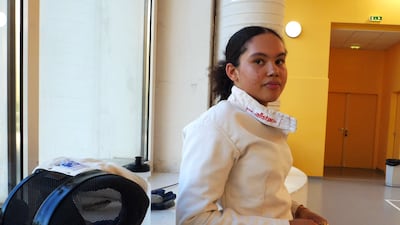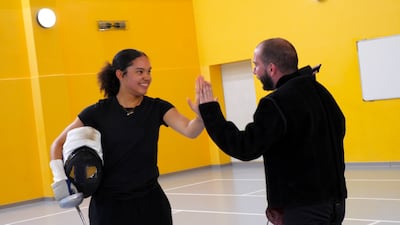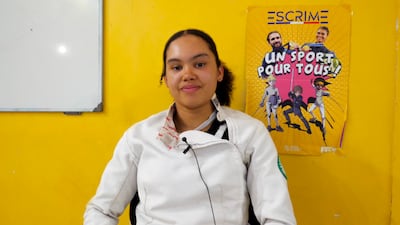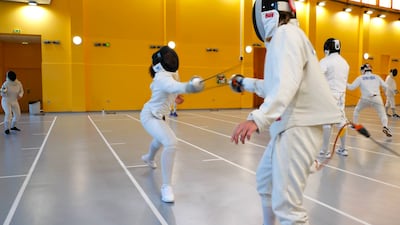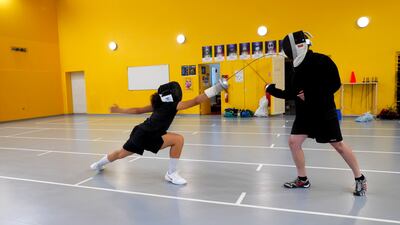For one French teenager in a Parisian district preparing to host the Summer Olympic Games next week, the legacy of the event has already been written in her own hopes of future glory.
Amateur fencer Kelis Assembe Ndoum, 15, has a national team hero to follow when the competition begins – and a handful of tickets the local government has given to local enthusiasts.
At the Grand Palais in the shadow of the Eiffel Tower, she will follow the fencing rounds as well as beach volleyball and women's football.
“There'll surely be connoisseurs and, of course, the energy will be better than if I sat at home alone watching it on TV,” she tells The National.
“I'd love to take part in the Olympic Games as an athlete one day."
Her idol, 32-year-old French champion Ysaora Thibus, is lined up to compete, hoping to add gold to the team silver she won in Tokyo three years ago.
“I want to get to the highest possible level and innovate to show that one can make a living being a fencer,” says Kelis as she scrolls through her phones to show her favourite fashion shoots including Palestinian-American supermodel Bella Hadid wearing fencing-inspired clothes.
What has given hope to Kelis has not spread throughout the French capital.
Outside, on the streets of Seine-Saint-Denis, the sense of neglect has not left and locals find it hard to show enthusiasm for the Games.
The path to becoming an athlete is riddled with obstacles in the department, which has the lowest number of sports facilities per inhabitant in France despite heavy investments by local authorities to democratise sports.
There are just over five gyms per 10,000 people in Seine-Saint-Denis, compared with eight per 10,000 in the richer Hauts-de-Seine.
Grumbles abound
The most popular city for tourists in the world, Paris will be the site of many high-profile events such as beach volleyball at the Eiffel Tower and fencing and taekwondo at the Grand Palais.
Seine-Saint-Denis is the poorest department of France but it is also home to the iconic stadium, the Stade de France. Crossing the divide between sports and popular interest is the ultimate test facing the organisers just over a week before the opening ceremony.
“Olympic Games are for the rich” and “we won't benefit from the Games” are oft-heard remarks.
Even free tickets struggle to find takers, say local authorities in the Seine-Saint-Denis neighbourhood of Montreuil, where Kelis trains.
She speaks with passion of her love of sports in a cafe of Montreuil, a multicultural town where close to a third of the population lives under the poverty line.
Kelis is one of two girls spotlighted for a documentary by the 28-year-old filmmaker Yassine Benhoumane. Working with the city hall's sports department, he is preparing a film to be broadcast after the Games that profiles six young athletes. There is also a breakdancer, a swimmer, a gymnast, a wrestler and a boxer.

Kelis was 13 when she started fencing in earnest at a new club opened with the support of the city hall in 2022, training with adults because there were no children when she first joined.
“I don't have any friends in the club. I like the adults but it'd be weird if we became close friends,” she says with a laugh.
Promoting Spotlight
“Fencing is one of those sports that's not promoted enough,” says Benhoumane. “But things are changing.”
Kelis developed her interest in sports – she also does judo and has dabbled in basketball – alone, even though her father, from Cameroon, was an avid footballer when he was young.
“I have more expectations for myself than my parents have of me,” she says.
Now, at 15, she has won several local and national competitions and is ranked 56th at national level.

From September, she will join a specialised high school with a compressed work schedule that ends at 2pm to free up afternoons for training.
Her favourite move is the so-called fleche, in which she runs with her epee – a fencing weapon closely related to the sword – at her opponent. She also likes to aim for the feet to surprise her adversary.
“I like the image that sports give me. I do loads of other things thanks to sports. Six months ago, I would have never thought I'd be profiled by my city in a documentary film. My teachers now have a higher opinion of me,” she says.

It's a reputation that appears well-deserved. In recent years Kelis has trained every weekday and competed most Sundays, waking up at 6am to take several buses carrying heavy bags – mostly on her own.
She lives with her sister and mother, a child carer, who sometimes struggles to find the energy to go with her to competitions.
“I can understand why it's not exactly pleasurable to wake up at 6am on a Sunday on a rainy winter day. At first, she was motivated and would film me. Now, I have to announce my points to her,” Kelis says.
Countdown to the Paris 2024 Olympic Games – in pictures
She praises her mother for supporting her ambitions on a tight family budget. Money is a source of stress at home, says Kelis, who does not own any of her swords or protective outfit but borrows them from her club.
“My mother sacrifices herself for us so that we don't lack anything. There are things I won't ask her to buy like a whole fencing set,” she adds. A protective jacket alone costs more than €70.
As she prepares for travel internationally to compete next year, she wonders if it's worth finally buying her own gear.
“My mum and I need more information,” she said, showing maturity beyond her years.
World-class ambitions
One day, she hopes, she'll become a world champion and combine her passion for fencing with her love of fashion and art – much like 32-year-old Ms Thibus, who has had a rollercoaster year of suspension after a drug test, which was then dropped, followed by injury last month in a training session. She is aiming for gold in both the individual and team events.

Like many teenagers, Kelis has no particular interest in politics, although it has played an important role in getting her into competition.
One of the few remaining bastions of the “red belt” – a reference to the French Communist Party's former grip on industrial Parisian suburbs – Montreuil has a history of investing in sports, although it currently needs €6 billion to reach the same level of infrastructure as the French average, according to sports municipal councillor Olivier Charles.
Montreuil's most recent gymnasium was built in 1974 and its annual sports budget is just €4 million.
State support
When Kelis's first fencing club closed down, Mr Charles, a former rugby coach, reached out to another one in neighbouring Bondy to ask them to also install in Montreuil – and it worked.
The idea is to popularise sports that are often viewed as only for the rich such as fencing, which often only pops up in conversation when watching duels in period dramas.
“It's working really well,” Mr Charles says.
Like many local officials, his expectations regarding the Olympic Games are low.
In an interview, Seine-Saint-Denis department sports councillor Zainaba Said-Anzum pushed back against the idea that Montreuil and other cities have been neglected, saying that 600 companies and more than 2,000 people from the department have worked on preparing the Games within its boundaries.

“We have brought sports in the public sphere in 24 different sites,” she says. “The department will include the media village and the athletes' village – in no way have some areas been favoured compared to others.”
In Montreuil, the only change the Games have brought is the renovation of a 10-metre deep swimming pool used by divers for training, says Mr Charles.
This has also caused grumbling because the renovation and usage by athletes will have barred locals from using it for nearly two years.
“I hope that if there are economic benefits, they'll help us renovate our infrastructure and build new gymnasiums,” says Mr Charles. “Otherwise there isn't much point.”
